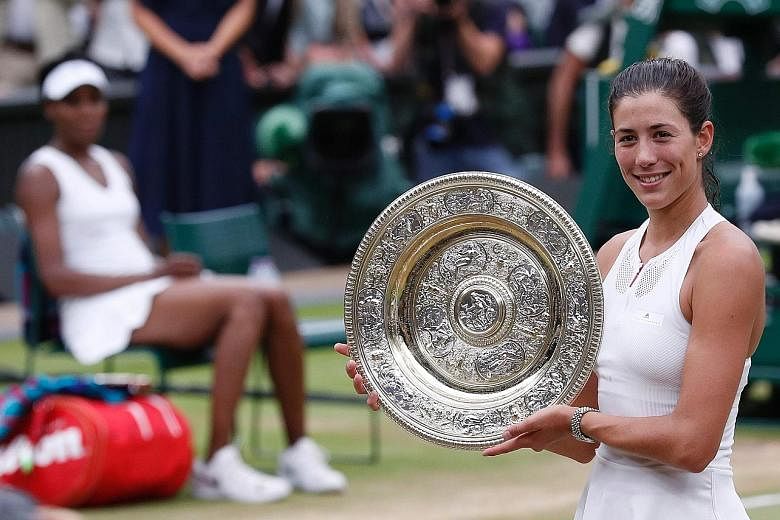It's not just that I want to win. I want to win against the best, on the biggest stages, when the biggest prizes are on the line.
The satisfaction you feel when you do it - nothing else compares.
The biggest events, the biggest matches, they bring out the best in me. That's when I learn about myself and discover just what I am capable of achieving.
People say that athletes have to learn how to play without nerves. But I don't believe that. I think it's good to be nervous. I like the feeling of being nervous before my matches. The key is that you don't let the nerves become negative.
I feel good when I step on a big court like Centre Court at Wimbledon, or a full stadium in Singapore for the WTA Finals.
In those moments I feel like that's where I want to be, that's what I practise for. That's where I play good. That's what motivates me - to have the chance to play these matches.
To win my first Slam, I had to beat Serena Williams in the Roland Garros final last year. I remember in my press conference, people asked me who I would like to play in the final - world No. 1 Serena or her semi-final opponent Kiki Bertens, who was ranked world No. 58.

The answer was easy. I wanted to play Serena.
When I found out I was playing Venus Williams in the Wimbledon final this year, again, I was looking forward to it.
Venus is playing incredible tennis this year and she is a five-time singles champion at Wimbledon. She is a master on the grass, whereas I am still learning to become comfortable on it.
I grew up watching her play and it was incredible to get the chance to play her on Centre Court at Wimbledon. I was so excited to go out there and try and win, especially against someone who was a role model.
Of course, it's one thing to be excited and another to actually execute.
Wimbledon was my first final since I won the French Open over a year ago. Every week you struggle to find the perfect balance to win the trophy. Sometimes you're tired, you feel pain, or your confidence is not there.
Winning tournaments is hard. You have to find the recipe to feel good fitness-wise, mentally, and your tennis has to be there in every match. I was able to put it all together at Wimbledon. Pretty good timing, right?
One of the secrets to finding that balance is learning to accept all the things that a tournament can throw at you. That way you can stop wasting energy on things you cannot control and just focus on yourself.
For example, I used to feel very uncomfortable on grass. I would get frustrated easily because the ball bounces funny and your movement is a little bit different. It took me a while to calm down and say: "Hey, it's grass, you have to adapt to the surface."
Once I made the Wimbledon final in 2015, everything changed for me because I stopped complaining and realised my game suits this surface. From that moment, I've been telling myself that I like grass and look at it in a positive way. As we can see, it made a big difference.
In the same way, you have to learn to accept that you do not always have control over the match. I am an aggressive player and I like to take my chances and go for it.
I'm not trying to hope for anything. I want to think, win or lose, the match is on my racket.
But that's not always true because in tennis you have an opponent across the net. We are not playing in a vacuum. What she does dictates what I do and sometimes she will be playing better than me.
If I don't accept that and adapt my game and my mentality, I will lose quickly because I will get frustrated for no reason.
The most important win I had during the fortnight at Wimbledon was over Angelique Kerber in the round of 16. Kerber has always been a tough opponent for me and she went into Wimbledon as the world No. 1.
She was playing fantastic throughout the match, but even when she was leading in the third set, I wasn't worried.
I told myself: "She's the world No. 1. Of course she's a great player and she was playing good."
So I was calm and I just thought that if I continue playing well then I will have my chance.
People see me as a powerful, aggressive player, but here's a secret: At the beginning of my career I was actually more of a grinder. I played a more traditional Spanish style like you see on the clay courts, relying on my speed to defend, run, and play lobs.
But then my body started to change. I grew stronger and taller. My arms were longer. I couldn't be one of those speedy players at the back of the court who got all the balls back. I felt like I had to adapt.
I also realised that on the professional circuit, it's more beneficial to be good on hard courts because that's where we play most of our matches. I had to become more aggressive.
That's how I became a power player. And thank goodness I did, otherwise I probably would have never become a Wimbledon champion.
• Garbine Muguruza serves as an ambassador for Room to Read, a non-profit organisation focused on literacy and girls' education.

